- Home
- Robin Hobb
The Soldier Son Trilogy Bundle Page 22
The Soldier Son Trilogy Bundle Read online
Page 22
I recalled the flatboat captain’s warning that Old Thares would smell far worse than the timber fires had. When I asked my father about it, he shrugged his shoulders.
“Much coal is burned in Old Thares, and it has been a city for hundreds of generations. It is bound to smell like a city. Old Captain Rhosher probably hasn’t left the river in twenty years. He can’t smell the smells of his own boat and crew, but he’s happy to tell you that the city stinks. It’s all in what one is accustomed to, Nevare, and a man can become accustomed to almost anything.”
I found myself doubting that. My father read my misgivings. He stood beside me as I leaned on the railing, staring glumly across the river toward the rows of smoke-blackened stone buildings that crowded right to the river’s edge. Scarcely any natural land remained. Stonework lined the banks of the river and the rise and fall of the water marked plainly by the slime. At intervals, foul coils of thick water oozed into the river from open trenches or gaping pipes, discharging their stench into the air and their filth into the river. Despite this, ragged hooligan youth fished and fought and wandered dazedly along the reinforced banks of the river. Stunted bushes and thick water plants blanketed the muck at the river’s edge. Above and beyond the hunched warehouses and factories was an undulating roof of housetops and smoking chimneys. It was as drear and forbidding a sight as any I had ever seen, and more ominous to my eyes than any arid stretch of desert or harsh prairie land.
The aromatic smoke from my father’s short pipe was a welcome mask for the lingering odors in the air. After a time, he knocked the husk of burnt ashes from the bowl. “I never went to the Academy. You know that.”
“I know that it didn’t exist when you were my age, sir. And that you had a great deal to do with its creation.”
“That’s true, I suppose,” he replied modestly as he tamped more tobacco from his pouch into his pipe. “I was educated at the Arms Institute. I attended at a time when those of us who expressed a desire to join the cavalla were regarded as somewhat…above ourselves. Cavalla assignments were the rightful domain of the families that had served the old kings as knights. Even though those families had dwindled, leaving our mounted forces undermanned, some felt it was almost against the will of the good god for a young man to want to be what his father had not been before him. Yet a soldier is a soldier, and I had persuaded my father that I could serve my king as well on horseback as I could on foot. I will admit that I was sorely disappointed when I was marked to be an artilleryman. It seemed the touch of the good god himself when that changed and I was sent off to the cavalla. Well.” He put the stem of the loaded pipe to his lips, gave flame to it from a sulfur match, and took several encouraging puffs to get it going well before he continued. “Here in this city, I fear you will live as I did during my years at the Arms Institute. No open air, not enough space to run, mediocre food, and living cheek by jowl with your fellow cadets. Some of them will be all a good officer should be, already. Others will be brutish louts and you will wonder why the good god made them soldier sons, let alone destined them to be officers. But when your days here are done, I promise you that you will return to living like a free man again, to roam and hunt and breathe the fresh air of the wild spaces. Think of that when the city smoke and endless gray nights become oppressive. It may give you heart.”
“Yes, sir,” I replied, and tried to find relief in the thought, but it was elusive.
We docked in Old Thares late that evening. My uncle had sent a man with a wagon. He hoisted our baggage into the bed of the wagon and tethered Sirlofty and Steelshanks to its tail. I rode alongside my father on the spring seat of the rather humble wagon and tried not to wonder if this was an affront to my father’s status. The night was chill, with a warning of damp in the air that promised that winter would soon arrive. We left the docks and rumbled through the poorer sections of Old Thares, then through a commercial district, quiet in the darkness save for occasional watchmen. Finally we emerged from the town’s clutter and climbed into the gentle hills to an enclave of manors and estates. When we arrived at my uncle’s home, the great house was dark save for one yellow lantern at the main entry and a single set of windows alight above us. Servants swiftly appeared, including a groom who took our horses. My uncle’s man greeted my father and told him that his mistress and my cousins were long abed, but that my uncle had had word of our imminent arrival and awaited us in his study. We followed my uncle’s man into his house and up a richly carpeted staircase while behind us servants struggled with our heavy trunks.
At the double doors of my uncle’s study, his man rapped lightly, then opened the door for us and stood to one side as we entered the warmly lit study. There any doubts I’d had about my uncle’s welcome of us were dispersed. Not only were wine, cold meats, cheese, and bread set out on a table to welcome us, but also tobacco for my father. My uncle, clad in an elaborate smoking jacket and silk lansin trousers, rose as we entered the room and came to greet my father with an embrace. Then he stood back from me, pipe in hand, and feigned amazement at how I had grown. He insisted that we sit down immediately to the late night repast he had had prepared for us, and I was glad to do so.
Their conversation flowed over my head as I ate. I was glad to be seen and not heard, for it afforded me the uninterrupted opportunity to enjoy the best food I’d faced in some days, and also to see my father and my uncle as I’d never witnessed them before. In the next hour I realized what had always escaped me, that my father and my uncle were close, and that my Uncle Sefert not only rejoiced in my father’s elevation but had genuine affection for his younger sibling. I had been a child the few previous times I had seen them together, and on those occasions they spoke and behaved with the reserve appropriate to their stations. Perhaps it was the lateness of the hour or the casual setting, but tonight they spoke quickly, laughed heartily, and generally behaved more like two boys than two peers of the realm.
As if to make up for lost time, they discussed a dozen topics, from the health of my father’s crops and the product of my uncle’s vineyards to my uncle’s marriage plans for his daughter and my father’s selection of prospects for Yaril’s hand. My father spoke of my mother’s gardens, and said that he wished to visit the flower market and take new dahlia tubers home with him, to replace the ones devoured by rodents earlier that summer. He spoke of my mother’s pleasure in her garden and home, and how his daughters grew all too swiftly and would soon leave his protection. In contrast, my uncle spoke of his wife’s discontent and ambition with painful honesty, acknowledging that she was ill pleased with my father’s elevation in status, as if somehow his rise had compromised my uncle’s position. “Daraleen has always been jealous of her position. She was a younger daughter in her family, and never thought to be wed to a first son. It is almost as if she fears that some of her honor will be taken from her if others rise to share the same footing. I have tried to reassure her, but alas, her mother seems to share her daughter’s apprehension. Her family behaves as if the new nobles sprang from common stock, but every one of the soldier sons King Troven elevated had a noble father. Nonetheless, my wife’s family shuns contact with the new nobles as upstarts and frauds. It is without foundation, but there it is.”
My father commiserated with him on this, taking none of it personally, as if they were speaking of a house with a cracking foundation or a field suddenly prone to root rot. He did not condemn the woman, nor was there any discomfort in how frankly they discussed her jealousy. It was a flaw they both acknowledged, but did not allow to affect their relationship.
Daraleen went to great pains to cultivate her friendship with the queen. She put their daughters before her majesty at every opportunity, and hoped to see them invited to court for an extended stay. To that end my younger cousin, Epiny, had begun to study the occult, for spiritualists and séances and other such nonsense fascinated the queen. My uncle was plainly displeased by this. “I have told her she is to regard it as studying pagan beliefs or Plainsmen legends. At f
irst, she seemed to share my opinions of it, but the longer she studies that claptrap, the more she babbles of it at table and the more validity she seems to give it. It troubles me, Keft. She is young, and unfortunately behaves even younger than her years, but I think the sooner she is settled with a solid man, the better it will be for her. I know that Daraleen has high ambitions for her, and hopes to marry her above our station. Nightly she reminds me that if Epiny finds favor with the queen and is invited to court, she will be seen by the finest young nobles of the realm. But I fear for my daughter, Keft. I think she would be better off studying the scriptures of the good god than researching crystal chimes and telling fortunes with silver pins.”
“She does not sound so different from my own Yaril. It seems to me that Elisi, too, went though a flighty period at about that age. All she wanted to babble about was what she had dreamed the night before, and although she knows I don’t approve of the old holy days, she sulked for a week when I would not allow her to go to a friend’s Dark Evening ball. Give Epiny a year or so, brother, and I expect her father’s common sense will come back to her. Girls need those flights of fancy and time to indulge them, just as boys pass through a reckless time of measuring their courage by challenging themselves.”
I was a bit surprised to think that fathers took so much thought over their daughters. Then, as I pondered it, it seemed that of course it must be so, and I wondered if someday Carsina and I would have daughters that we must safely shepherd into marriages. I wondered if I would ever sit with Rosse and discuss my children’s prospects. I was jolted from my thoughts when Uncle Sefert suddenly addressed me. “Nevare, you have a pensive look. What are you thinking?”
I spoke honestly, without giving thought to my words, saying, “I was hoping that someday Rosse and I will sit at table together and discuss our plans for our children with as much fondness and pleasure as you share with my father now.”
I had not intended to flatter either of them, and yet my father gave me the warmest smile I had ever seen on his face. “Such is my wish for you also, my son,” he assured me. “When all is said and done, family is what counts for most in this world. I hope to see you have a distinguished career in the cavalla, just as I hope to see Rosse manage my lands well, and to see your sisters well wed, and young Vanze honored as a pious and learned man. Yet above all, I hope that in the years to come you will remember one another fondly, and always do whatever you can for the honor and well-being of your family.”
“As surely my younger brother has done for our family over the years,” my Uncle Sefert added, and was rewarded by the slight blush that suffused my father’s face at his elder brother’s praise.
I perceived my uncle then as a very different man from what I had previously supposed him. I decided that their free discussion in front of me marked, perhaps, their recognition that I was now a man and more worthy of confidences than I had been as a child. As if to confirm this, my uncle then asked me a number of polite questions about our journey and my preparation for the Academy and its rigors. At the news that I had brought Sirlofty, he smiled and nodded his approval, but cautioned, “Perhaps you should stable him with me until you reach the state in your training where they will allow you a personal mount. I have heard that the officer in charge of the young cadets has instituted a new practice of putting all of them on uniform horses to begin with, so that pace and stride and appearance are matched for each regiment.”
“I had not heard of that,” my father frowned.
“It is quite recent,” my Uncle Sefert assured him. “The news of it likely has not reached the eastern frontiers yet. Colonel Rebin has recently chosen to retire; some say his wife importuned him, others that the gout in his knees and feet has become so painful that he can scarce bestride a chair, let alone a horse. There are also less kind whispers that he somehow offended the king and found it wiser to leave the post before he was relieved of it. Whatever the cause, he has left the Academy and Colonel Stiet has taken it over.”
“Colonel Stiet? I don’t believe I know him,” my father observed stiffly. I was alarmed at how unsettled he seemed to be at this sudden news.
“You would not. He isn’t a frontier man, or even cavalla, but I’ve heard he is a good military officer for all that. He had risen through the ranks here at home, by diligence and long years rather than field promotions. Yet the gossip is that he is more given to show than Colonel Rebin was, and his insistence on well-matched horses, all of a color, for each regiment is but the tip of it. My wife’s family knows the Stiets well. We have often dined together. He may not be a soldier’s soldier, but he will have the Academy’s best interests at heart.”
“Well, I’m not opposed to a bit of spit and polish, I suppose. Attention to detail can save a man’s life in a ticklish situation.” I could hear that my father was speaking for my benefit, and suspected he was trying to make the best of a bad situation.
“He’s more than polishing uniform buttons and shining boots.” My uncle paused. He stood up, paced a turn about the room, and then continued. “This is gossip, pure and simple, and yet I think I’ll pass it on. I have heard he favors the soldier sons of the established nobles over King Troven’s battle lords, as some call you.”
“Is he unfair?” My father asked the question bluntly, his voice going low with concern.
“Strict. Strict, but not unfair, is more what I’ve heard. My wife is a close friend of his lady, and knows them well. There is talk that…well. How to put this. The cavalla is ultimately commanded by the king, of course, as is all our military. But some fear that too many battle lords’ sons rising to officer status will shift the military to…to a…well, to a loyalty to the king that might be unhealthy for the rest of the kingdom. The Council of Lords already saw its power diluted when the new nobles were granted equal seats with them. It is much easier for the king to have his way there. And some say that if ever it came to, well, to an outright rebellion by one lord or another, the king might use the power of his army against the rebel lord. And that an army led by the sons of battle lords might be less dismayed by that than an army commanded by old nobles’ sons would be.”
An awkward silence fell as my uncle seemed to run out of words rather than stopped speaking. My father asked him, somewhat stiffly, “Is there, in fact, any danger of such a rebellion? Do you think any of the old lords might rise against our king?”
My uncle had been standing near the fire. He crossed to a chair and sat down in it heavily. “There is talk, but I think it will never go beyond talk. Some say he favors his new nobles too much. His push to the east benefits them, and fills the king’s coffers, but does nothing for noble families that lost their most profitable holdings when the coastal stretch was ceded to Landsing. Some say that we have recovered from our long war with Landsing, and that with a determined military, we could defeat them now, and take back what is rightfully ours.”
My father was silent for a long time. Then he said quietly, “I do not think such decisions are for the lords, but for the king, whom the good god put over us. I mourn as much as any Gernian, soldier or lord, for the lost coastal provinces. King Troven did not relish doing what he must to gain an end to that long war. Have they forgotten all we endured, that long last decade of war? Do they forget that once we feared to lose not just the coastal provinces but all the lands along the Soudana as well? King Troven did not do so badly for his old nobles. He did better than his father had done, beggaring us with a war we long knew we could not win. But come. Enough of chewing on old bones. Tell me more about Colonel Stiet.”
My uncle considered before he spoke. “He is the soldier son of an old nobility family. Politically, his heart lies with the old nobles in this divide. Some of them say that we have far too many new nobles’ sons attending the Academy now. In the last two crops of first-year cadets, the new noble sons have outnumbered the old. This year the ratio is even more skewed. You battle lords seem a vigorous lot when it comes to fathering sons.” He smiled at my fath
er as he said it. I held very still. I wondered if it pained my uncle that his younger brother had fathered three sons to his one.
My father put my uncle’s unspoken warning into words. “You think that Stiet’s family and friends may urge him to balance that ratio.”
“I do not know. I think pressure will be applied. I do not know Stiet well enough to say if he will give way to it. He is new to his post. He has promised to hold all the cadets to a high standard. He may hold that standard more tautly with the soldier sons of battle lords than he does with those of the old guard.”
My father gave me a sideways glance and then nodded to himself. “Nevare can bear that sort of scrutiny, never fear.”
I felt pride that my father had such confidence in me, and tried not to let anxiety find any lodging within me. They moved from the table to their comfortable chairs by the hearth. It was early in the season for a fire, and yet after our long journey and damp wagon ride, the warmth felt good to me. I was honored to sit with them while they smoked and talked, and tried to pay attention to the conversation even if I knew it was not my place to join in. Several times my uncle addressed me directly to include me in their conversation. From family matters they passed to general discussion of the political climate. Landsing had been quiescent of late, even negotiating favorable trade exchanges and allowing our king generous passage to Defford, one of their best seaports. Uncle Sefert felt that Landsing encouraged our eastward expansion, for it kept our military busy and our king’s acquisitive eyes away from them. My father did not think King Troven was overly greedy, only that he saw the benefits of having a generous border of territory that he controlled around our populated areas. Besides, all knew he had brought civilization, trade, and other benefits to the Plainsfolk. Like as not, even the Specks would eventually be better off thanks to our assimilation of the wilds. They made no use of the forests, farmed no lands, and harvested no timber. Let them learn from Gernian example how to use those resources wisely and surely all would benefit.

 Ship of Destiny
Ship of Destiny Golden Fool
Golden Fool Assassins Apprentice
Assassins Apprentice The Dragon Keeper
The Dragon Keeper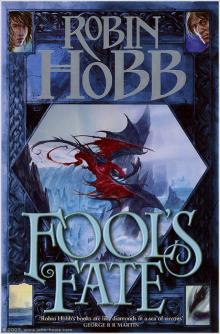 Fools Fate
Fools Fate Fools Errand
Fools Errand Fools Assassin
Fools Assassin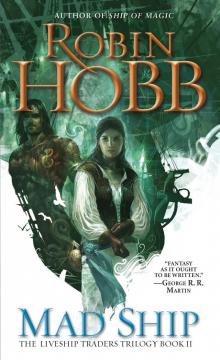 The Mad Ship
The Mad Ship Shamans Crossing
Shamans Crossing Ship of Magic
Ship of Magic City of Dragons
City of Dragons Dragon Haven
Dragon Haven Fools Quest
Fools Quest Blood of Dragons
Blood of Dragons Assassin's Fate
Assassin's Fate Assassins Quest
Assassins Quest Renegades Magic
Renegades Magic Forest Mage
Forest Mage Assassin's Apprentice tft-1
Assassin's Apprentice tft-1 Assassin's Quest tft-3
Assassin's Quest tft-3 Royal Assassin
Royal Assassin Assassin's Apprentice (The Illustrated Edition)
Assassin's Apprentice (The Illustrated Edition) Assassin's Quest (UK)
Assassin's Quest (UK) Royal Assassin (UK)
Royal Assassin (UK) FF3 Assassin’s Fate
FF3 Assassin’s Fate Royal Assassin tft-2
Royal Assassin tft-2 Fool’s Assassin: Book One of the Fitz and the Fool Trilogy
Fool’s Assassin: Book One of the Fitz and the Fool Trilogy Fool's Fate ttm-3
Fool's Fate ttm-3 The Golden Fool ttm-2
The Golden Fool ttm-2 The Liveship Traders Series
The Liveship Traders Series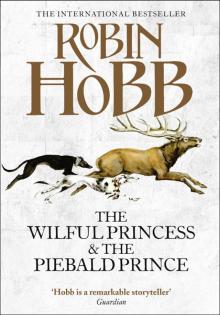 The Wilful Princess and the Piebald Prince
The Wilful Princess and the Piebald Prince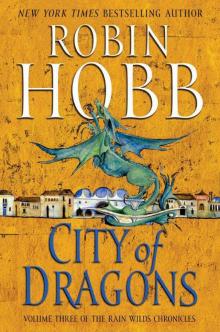 City of Dragons rwc-3
City of Dragons rwc-3 The Tawny Man 1 - Fool's Errand
The Tawny Man 1 - Fool's Errand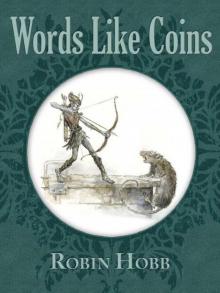 Words Like Coins
Words Like Coins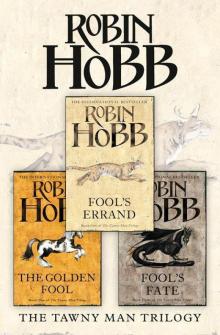 The Complete Tawny Man Trilogy Omnibus
The Complete Tawny Man Trilogy Omnibus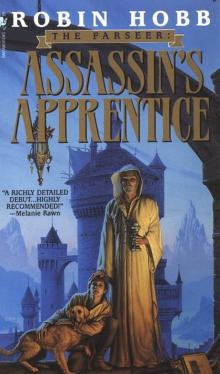 Farseer 1 - Assassin's Apprentice
Farseer 1 - Assassin's Apprentice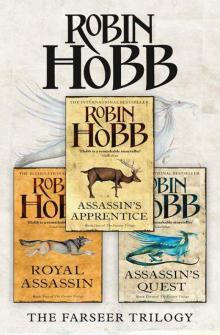 The Complete Farseer Trilogy Omnibus
The Complete Farseer Trilogy Omnibus The Soldier Son Trilogy Bundle
The Soldier Son Trilogy Bundle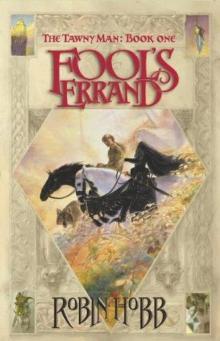 Fool's Errand ttm-1
Fool's Errand ttm-1 Blue Boots
Blue Boots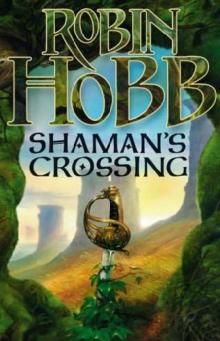 Shaman's Crossing ss-1
Shaman's Crossing ss-1 Mad Ship
Mad Ship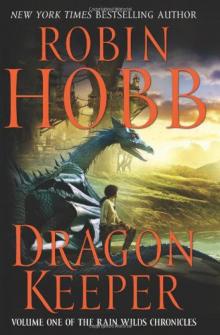 Dragon Keeper
Dragon Keeper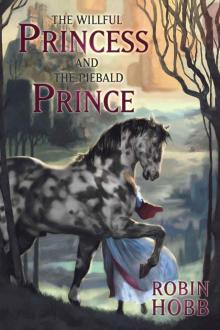 The Willful Princess and the Piebald Prince
The Willful Princess and the Piebald Prince Ship of Destiny tlt-3
Ship of Destiny tlt-3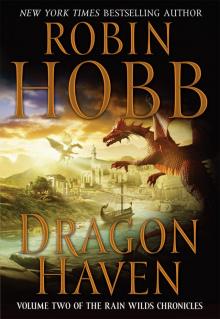 Rain Wild Chronicles 02 - Dragon Haven
Rain Wild Chronicles 02 - Dragon Haven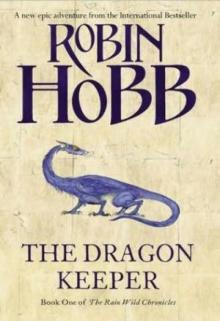 The Dragon Keeper trwc-1
The Dragon Keeper trwc-1 The Triumph
The Triumph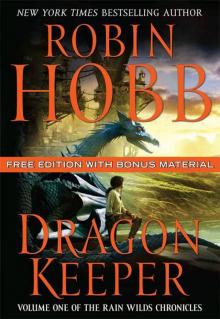 Dragon Keeper Free Edition with Bonus Material
Dragon Keeper Free Edition with Bonus Material Mad Ship tlt-2
Mad Ship tlt-2 The Inheritance and Other Stories
The Inheritance and Other Stories Tawny Man 02 - Golden Fool
Tawny Man 02 - Golden Fool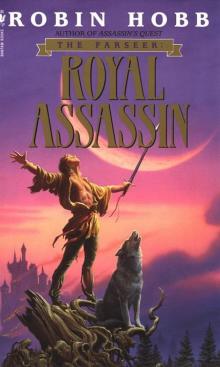 Farseer 2 - Royal Assassin
Farseer 2 - Royal Assassin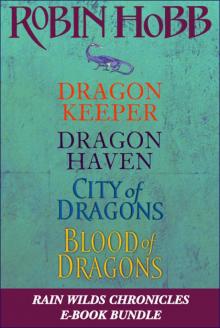 Rain Wilds Chronicles
Rain Wilds Chronicles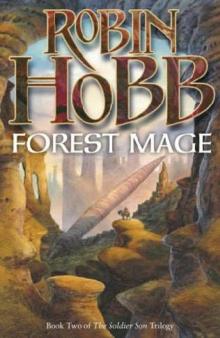 Forest Mage ss-2
Forest Mage ss-2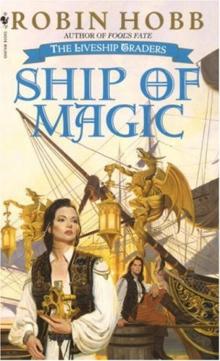 Ship of Magic lt-1
Ship of Magic lt-1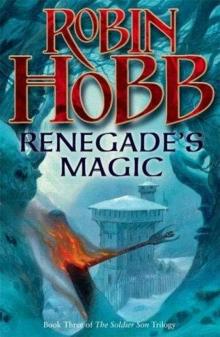 Renegade's Magic ss-3
Renegade's Magic ss-3